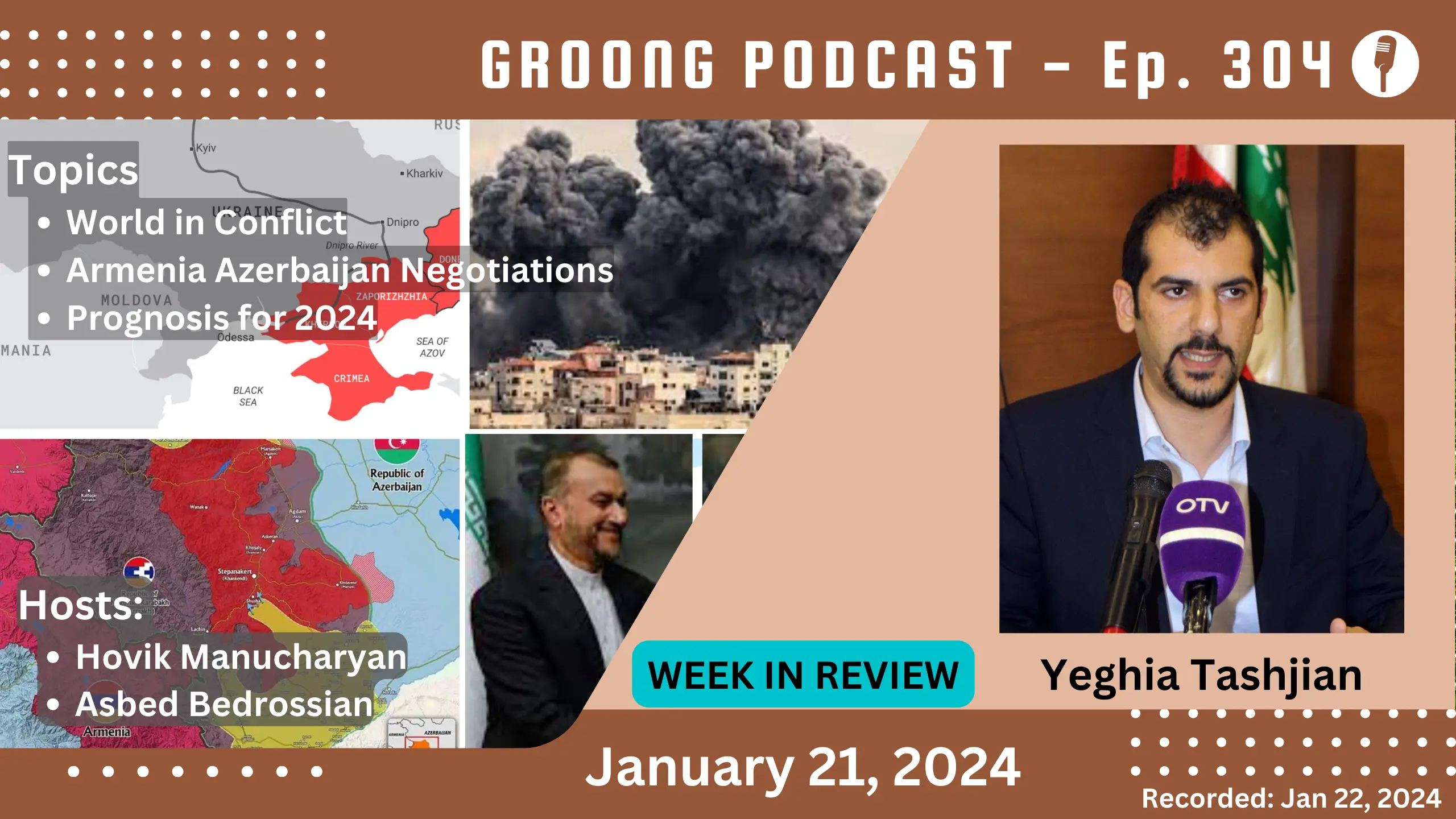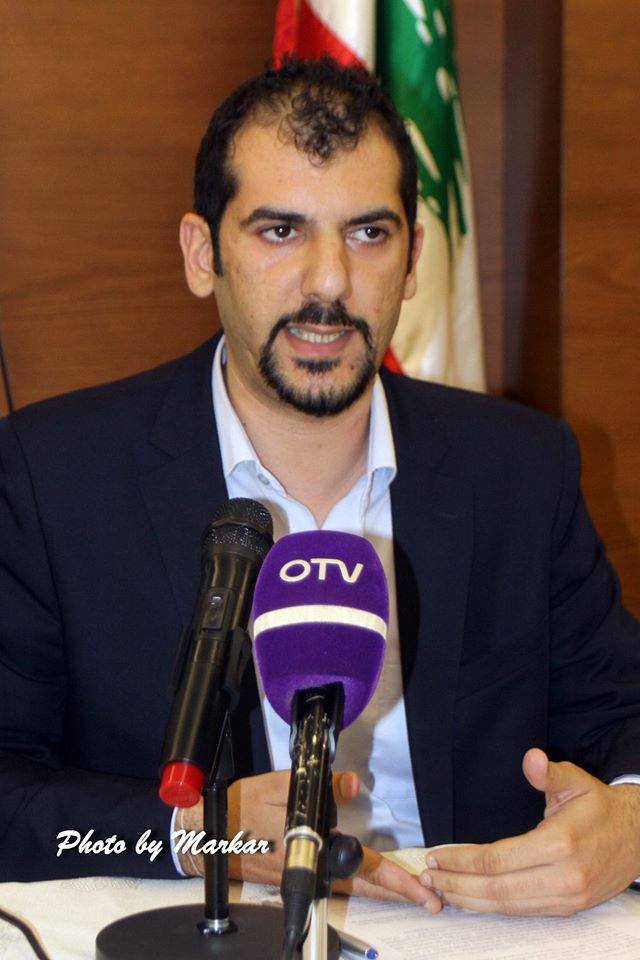Yeghia Tashjian - World in Conflict | Armenian Azerbaijani Negotiations | 2024 Outlook | Ep. 304 - Jan 21, 2024 [EP304]
Posted on Tuesday, Jan 23, 2024 | Category: Armenia, Politics, Israel, Middle East | Series: wir
Groong Links:
Guest:
Topics:
- World in Conflict
- Ukraine, Israel-Gaza, Middle East
- Armenia Azerbaijan Negotiations
- Prognosis for 2024
- Thoughts from the Participants
Episode 304 | Recorded: January 22, 2024
Show Notes
World in Conflict
Israel’s war on Palestine in Gaza is raging. We’ve gone over 25,000 dead and over 60,000 injured, which is a human tragedy by any standard of measurement.
All indications are that Israel is preparing to take the war north to Lebanon and involve Iranian-allied Hezbollah forces. Yemen has managed to severely disrupt shipping lanes in the Red sea. Iran struck targets in Iraq, Syria and even bombed alleged terrorist camps in Pakistan. The following day, Pakistan retaliated using the same allegations.
So the prospects for peace look dim.
Questions:
- Is the risk high that the Israeli war in Gaza will expand into a larger, regional conflagration?
- What were the reasons for Iran’s strikes on Iraq, Syria and Pakistan, and what’s the significance of their timing?
- Are these strikes strategic in nature, or geopolitical? What message is Iran sending, and to whom?
- For a military action from a nation like Iran, the media reverberations in the US were trivial. There was hardly any echo in the mainstream media here, instead of the expected drumbeat of war. Why is that?
In the past few months western resolve, and funding, for Ukraine has started to weaken. Some attribute this to the year in US elections, the prospects for a new Trump presidency, as well as the Israel-Gaza war which started in October, and has diffused western diplomatic and financial resources away from Ukraine.
Questions:
- What’s the state of the war in Ukraine?
- Are there winners and losers in this conflict?
- How will Russia emerge from this conflict?
Many observers are waiting to see how the war in Ukraine will shake out, because they expect that its outcome will determine the so-called “new world order”.
Question:
- How will this affect its engagement in the South Caucasus, Armenia, and Artsakh?
Armenia Azerbaijan Negotiations
Iranian Influence
One of Russia’s main partners in the war in Ukraine has been Iran; it has provided unwavering military and diplomatic support to Russia. Naturally Iran’s raised political and military profile, both in Ukraine and the Middle East, carries over that influence to our region around Armenia.
Questions:
- How do Iran’s actions in the Middle East affect the Armenian Azerbaijani negotiations?
- Do you think that there is a high level of convergence between the national security interests of Armenia and Iran in our region, currently? How can Armenia leverage that synergy to its benefit?
Western Influence
In the past 10 days we’ve had three international diplomats visit Armenia, without visiting Baku. Those individuals were Louis Bono (US co-chair), Toivo Klaar (EU special rep) and Javier Colomina (NATO).
Questions:
- What is the reason that these people didn’t fly to Baku immediately before or after coming to Armenia, as is customary? And don’t tell us it’s because of some phony elections in Baku.
- One option is, “you’re not welcome here, there’s nothing to discuss”. This matches Aliyev’s public rhetoric about Armenia but we don’t hear any criticism from these geopolitical centers, instead they keep talking about positive things.
- But if Aliyev’s behavior is a demarche against these regional powers, then why do they even come to Armenia?
- Is it possible that these diplomats are in Armenia to force Aliyev’s additional conditions against Armenia, and yield even more concessions?
In December you wrote an interesting article about whether the EU has a strategy in Armenia.
One of the tenets in the report you quoted struck me as a core bullet point around which a lot of the rest of the report was built. It said: The EU should ensure that “Armenia duly implements the commitments it has undertaken regarding the transport connection from Azerbaijan proper to Nakhichevan.” The report mentions that the EU has an interest in its realization. Another report emphasized that Armenia should not have unrealistic expectations of the EU.
So it sounds like the EU wants something out of Armenia, corridors specifically, and give pretty much nothing material in exchange. Maybe some goodwill political declarations.
Questions:
- What conclusions do you draw from all the foreign policy ruminations in the EU, about Armenia and the South Caucasus?
- Is there an EU strategy towards Armenia, and if there is one emerging, what would be the fundamental tenets of such a strategy?
- Is there any basis for thinking that the November 9 statement, specifically about transport links, is at all valid still, with Artsakh ethnically cleansed, the Lachin corridor erased, Armenian sovereign territories invaded, Armenian POWs still in Baku, etc.?
- Why would both Russia and the EU be calling for a corridor through Armenia for Turkey and Azerbaijan with no regard to Armenia’s security?
Prognosis For 2024 and Beyond
Stratfor Report
There was a Stratfor outlook for developments in the South Caucasus in 2024. Some Armenian media summarized it, and here are some key takeaways:
- Progress in negotiations will continue, but there will be serious risks.
- Disagreements on the “corridor” issue will remain.
- Armenia will use the West’s backing to push back on Azerbaijan
- Azerbaijan will continue military buildup on the border and continue with maximalist appetite
- Without progress in the first half of 2024, there will be a serious risk of war in the summer/fall time frame.
- Armenia’s dependence on Russia will continue.
- Russian-Azerbaijani trade will grow.
- If there is a war and Azerbaijan forcibly takes Syunik, Turkey and Azerbaijan will threaten to shift foreign policy more towards Russia, China and Iran, in response to western pressure to relinquish that territory.
Questions:
- What do you think of this high-level outlook for 2024?
- What are your own expectations in 2024?
Topics from the Participants
- Yeghia: The shame of Pashinyan’s drive to rename “Armenian History” to “History of Armenia”
- Hovik: Pashinyan changes to Armenia’s constitution fulfilling enemy demands
Wrap-up
That’s our Week in Review, we hope you found it helpful. We invite your feedback and your suggestions, you can find us on most social media and podcast platforms. Thanks to Laura Osborn for the music on our podcasts.
Guests

Yeghia Tashjian
Yeghia Tashjian is an regional analyst and researcher based in Beirut, with expertise in China’s geopolitical and energy security interests in Iran and the Persian Gulf. Currently he is an instructor in International Affairs at the American University of Science and Technology and International and Regional Affairs Cluster Coordinator at the Issam Fares Institute for Public Policy and International Affairs at the American University of Beirut.
Hosts

Hovik Manucharyan
Hovik Manucharyan is an information security engineer who moved from Seattle to Armenia in 2022. He co-founded the ANN/Groong podcast in 2020 and has been a contributor to Groong News since the late 1990s.
Disclaimer: The views expressed by Hovik Manucharyan on the ANN/Groong podcast are his own and do not necessarily reflect the opinions of his employer or any other organization.

Asbed Bedrossian
Asbed Bedrossian is an IT professional, and for years oversaw the central IT enterprise infrastructure and services at USC. His decades of experience spanned across IT strategy, enterprise architecture, infrastructure, cybersecurity, enterprise applications, data center operations, high performance computing, ITSM, ITPM, and more.
Asbed founded the Armenian News Network Groong circa 1989/1990, and co-founded the ANN/Groong podcast in 2020.